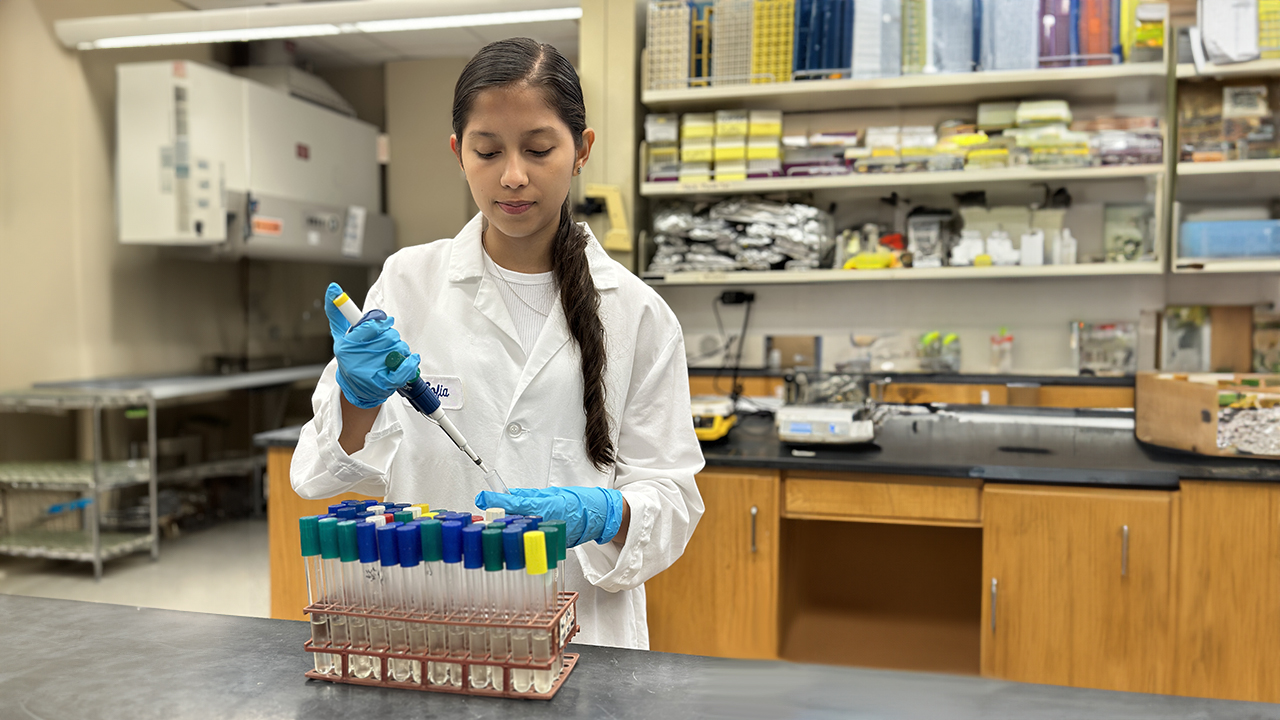content body

Sofia Sierra, a first-year doctoral student in the College of Agriculture at Auburn, is researching how to make infant formula safer by eliminating harmful bacteria using cold plasma technology. Sierra’s work, which focuses on the bacterium Cronobacter sakazakii, aims to make food products safer, such as powdered milk, which ultimately will prevent illness and reduce product recalls.
“Cronobacter sakazakii is a heat-resistant bacterium that can survive both pasteurization and dehydration, posing a significant threat in food products, which include shelf-stable infant formula.”
Sierra’s research explores the application of cold plasma, a novel technology that uses reactive species and charged molecules generated by electrical power to damage and reduce the bacteria in full-fat milk powder.
“The objective of my research is to determine the effectiveness of cold plasma in reducing Cronobacter sakazakii,” Sierra explained. “Our results have been promising, showing a significant reduction in the harmful heat-resistant bacteria that were not realized by other methods.”
Sierra’s research is part of an externally funded National Science Foundation interdisciplinary program that explores the use of plasma technologies in aerospace, medical, bioscience, and agricultural sectors. As a graduate research assistant in the food science laboratory under the direction of Amit Morey, associate professor in the Department of Poultry Science, Sierra works collaboratively with other faculty researchers at Auburn as part of the 10-member university and industry consortium on the Future Technologies and Enabling Plasma Processes (FTPP) initiative.
“My goal in life is ‘Science for the Benefit of Mankind,’ and I think cold plasma application in the food and agriculture sector will bring tremendous benefits to an agricultural state like Alabama as well as across the country,” said Morey, one of the co-investigators on the FTPP project and Sierra’s faculty mentor.
“One of the primary goals of the FTPP is to foster cross-disciplinary collaborations that can create new tools and technologies that can positively impact society. Sierra’s work is an important realization of that goal”, said Edward Thomas, co-PI of the FTPP project, professor of physics and dean of the College of Sciences and Mathematics.
Sierra is passionate about pursuing a career in research, whether in industry or academia.
“I believe that solutions to problems can only be found through exploring new methods and incorporating innovative technologies,” she adds. She discovered this passion for research in her initial interactions with Morey through her undergraduate student organization’s participation in “Hackathon,” a 48-hour event where student groups engage in rapid and collaborative engineering in a relatively short period of time. Held via Zoom, this group competition exposed her to food safety research, which led to an internship at Auburn, and ultimately, her pursuit of graduate education.
Throughout her graduate journey at Auburn, Sierra has taken advantage of every opportunity to be involved in student organizations, competitions and challenges. She encourages others to participate in Auburn’s workshops through RBD Library, University Writing, the Research Symposium and compete in the Three Minute Thesis (3MT) competition.
“I first learned about the 3MT competition through an email,” Sierra said. “Initially, I thought it would be impossible to condense an entire project into such a short presentation, but the idea intrigued me. It was something new and exciting, so I decided to register and take on the challenge.”
The 3MT competition, which requires students to present their research in just three minutes to a non-specialist audience, helped Sierra refine her communication skills and focus her research narrative. Sierra’s presentation, titled “Application of Cold Plasma to Eliminate Cronobacter sakazakii in Full-Fat Milk Powder,” taught her how to present complex topics clearly and concisely, a skill that has proven invaluable in her academic and research endeavors.
Sierra credits her experience in Auburn’s 3MT with her first-place win in the Three-Minute Flash Talk competition at the annual meeting of the FTPP conference in Birmingham, Alabama, in May. Sofia took home the top prize among the 26 competitors. In addition, she has gained confidence and realized her “competitive nature,” which has encouraged further participation in the Auburn Research Symposium, as well as the College of Agriculture’s 2023 fall showcase where she won the top prize in the poster presentation.
Sierra’s journey from an intern to a doctoral student at Auburn highlights the opportunities and growth that come with participating in academic competitions like 3MT. Her story serves as a testament to the value of stepping out of one’s comfort zone and embracing new challenges.
“Participating in the 3MT competition allowed me to really consider the impact of my research on the food and agricultural sectors,” Sierra said. “It was an enriching experience that helped develop my communications skills but also reinvigorated my passion for research and my commitment to making the world a better place.”




